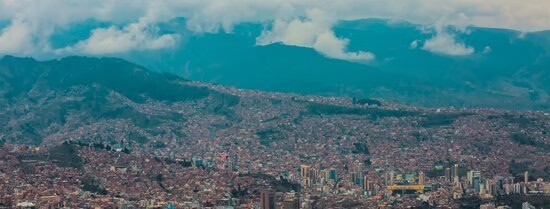Learn about strategies to reduce water, energy and transport sectors impacts and vulnerabilities caused by water extremes.
Water extremes are a big concern in Andean countries, even more so with the progression of climate change. Countries like Bolivia are struggling with serious floodings as well as lengthy droughts. Around 30% of the Bolivian population lack water security. Just in 2016, Bolivia faced its worst water shortage in 25 years. More than 400.000 inhabitants of La Paz and a number of other Bolivian cities were cut off water supply over the period of several weeks. The drought also had a tremendous effect on the agriculture in the highlands, with a loss of up to 90% of crops in some areas. This led to the declaration of a state of emergency. Meanwhile, Bolivia’s neighbouring country, Peru, is facing similar challenges. Floodings caused by increased melting of glaciers cannot be managed properly due to a lack of infrastructure and the capital city Lima is almost constantly on the brink of a water shortage.
IHS will be addressing these issues of water extremes in the Refresher Course 'Making Andean Cities Greener in time of Climate Change: Strategies to reduce water, energy and transport sectors impacts and vulnerabilities caused by water extremes'. It will take place in La Paz, Bolivia between June 3 - 15, 2019 and it will be coordinated by IHS academic staff Ogenis Brilhante and Julia Skinner.
The application deadline is April 15, 2019. Read more or apply on the course page.
During the course, the participants will work with real data they collected from one Bolivian and one Peruvian city and develop strategies and green actions for them. This will help the participants enhance their understanding of vulnerability and impacts of extreme water events and their ability to implement the learned skills in their own professional context.
By the end of the course, participants will be able to enhance, understand, analyse and assess vulnerabilities and impacts caused by water-extremes on the functioning of the three sectors and to propose strategies and green actions to help two selected cities (one in Bolivia, one in Peru but applicable to other cities in the Andes region) cope with water-extremes in climate change events.
The course, organised with the support of the Dutch Ministry of Foreign Affairs and Nuffic, is a sub-programme of the Orange Knowledge Programme (OKP) and eligible participants have to be Orange Knowledge Programme (OKP)/Netherlands Fellowship Programme (NFP) alumni from Bolivia and neighbouring OKP/NFP countries. Alumni are allowed to invite colleagues, if well motivated and to a limited extent. This course is aimed at alumni whose current practice is related to the theme of the course. Female participation is strongly encouraged. The participants will be chosen based on their relevant professional backgrounds, strong motivation and high potential of the prolonged development impact of the training.
Find out whether you are eligible to join a refresher course in your region in the list of eligibility criteria, visit the course page or apply here.

